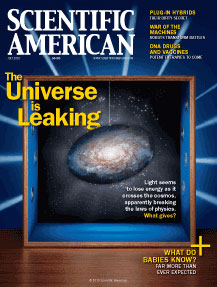Fraud, deception and lies in research reveal
how science is (mostly) self-correcting
In his 1974 commencement speech at the California Institute of Technology, Nobel laureate physicist Richard P. Feynman articulated the foundation of scientific integrity: “The first principle is that you must not fool yourself — and you are the easiest person to fool… After you’ve not fooled yourself, it’s easy not to fool other scientists. You just have to be honest in a conventional way after that.”
Unfortunately, says Feynman’s Caltech colleague David Goodstein in his new book On Fact and Fraud: Cautionary Takes from the Front Lines of Science, some scientists do try to fool their colleagues, and believing that everyone is conventionally honest may make a person more likely to be duped by deliberate fraud. Nature may be subtle, but she does not intentionally lie. People do. Why some scientists lie is what Goodstein wants to understand. He begins by debunking myths about science such as: (continue reading…)
read or write comments (14)
The comparative method of historical science helps to explain Haiti’s poverty
HISTORY IS NOT OFTEN THOUGHT OF AS A SCIENCE, but it can be if it uses the “comparative method.” Jared Diamond, professor of geography at the University of California, Los Angeles, and James A. Robinson, professor of government at Harvard University, employ the method effectively in the new book they have co-edited, Natural Experiments of History. (Order the lecture on DVD. Jared Diamond lectured, based on this book, as part of the Skeptics Society’s Distinguished Lecture Series at Caltech.) In a timely study comparing Haiti with the Dominican Republic, for example, Diamond demonstrates that although both countries inhabit the same island, Hispaniola, because of geopolitical differences one ended up dirt poor while the other flourished. (continue reading…)
read or write comments (13)
On Saturday, September 12, after flying 17 hours from Cluj, Romania to Budapest, Hungry to Zurich, Switzerland to L.A.X., I drove straight to the Queen Mary in Long Beach, where there was a big paranormal conference hosted by Dave Schrader of Darkness Radio. Dave is a very open-minded fellow, in the sense that he thought it might behoove his flock to have them hear what scientists think some plausible natural and normal explanations there are for the various supernatural and paranormal phenomena that his members tend to believe in and talk about at such conferences (there was even a ghost hunting expedition on the Queen Mary later that night, but I was wasted from flying for so long and passed on being spooked on the ship).
My keynote talk was Why People Believe Weird Things, a shortened version of which you can see on Ted.com, where I originally delivered this lecture. It includes much discussion about how east it is to fool the brain, perceptual illusions, cognitive missteps such as the confirmation bias, priming effects (where you prime the brain to see or hear the world in a certain way), and especially the power of expectation.
Surprisingly, everyone there was most friendly toward me, even though what I was basically telling them is that pretty much everything they believe about the paranormal is wrong. Many came up after to tell me that they too are skeptical of many of the phony baloney scam artists there are out there who are ripping people off with various flim flams, but of course they added the proviso that not all paranormal phenom are perpetrated hoaxes and that they like science because it can help them to discriminate between the true and false paranormal patterns. Okay, whatever it takes to get people interested in science, however, I did make it clear that to date science has yet to find any conclusive evidence for ESP and the like, so that instead of turning to the paranormal as an explanation for presently unsolved mysteries, why not just leave it as a mystery until science can explain it? In science, I noted, it’s okay to say “I don’t know.”
Here’s some iPhone pics I snapped while waiting for my talk to begin. Included is a pic of Frank Sumption and I. Frank is the inventor of “Frank’s Box,” which I wrote about in the January, 2009 issue of Scientific American. Frank’s Box is also called the “Telephone to the Dead,” and consists of a simplified radio receiver that cycles through the stations at breakneck speed such that one only hears snippets of words and sentence fragments, and it is here where the dead allegedly sneak in their messages to us living (or, where in my explanation, the “patternicity” happens, or the natural tendency to find meaningful patterns in random noise. I also snapped some pics of Bruce Goldberg, with whom I once appeared in the mid 1990s on a television show about past lives. Bruce is still churning out the self-published books, now on how he communicates with time travelers from the future. Finally, I will admit that New Agers have the coolest crystals.
• FOLLOW MICHAEL SHERMER ON TWITTER •
Comments Off on A Skeptic Among the Paranormalists
I believe in the power of science and humanity. Specifically, I believe that biodiversity is a good thing and that we have been rapacious in our treatment of the environment, although I think the environmental movement has greatly exaggerated our condition and that the environment is a lot more resilient than most environmentalists give it credit for. I don’t mind eating cows and fish, but dolphins and whales have big brains and they’re cool, so I don’t think we should kill them. I drive an SUV because I haul around bicycles, books, and dogs, but as soon as there is a bigger hybrid, I’ll buy it. And although I am a libertarian heterosexual who is about as unpink (in both meanings) as you can get, I believe people should have an equal opportunity to be unequal. As for evolution, it happened. Deal with it.
I don’t know why the God question is so interdigitated with political and economic issues, but it is. It shouldn’t be. It’s okay to be a liberal Christian or a conservative atheist. I am a fiscal conservative and a social liberal. I don’t think there is a God, or any sort of anthropomorphic being who needs to be worshipped, who listens to prayers, who keeps a moral scoreboard that will be settled in the end, or who cares one iota about who wins the Super Bowl.
This is why what we do in this life matters so much — and why how we treat others in the here and now is more important than how they might be treated in some hereafter that may or may not exist. If we knew for certain that there is an afterlife, we wouldn’t have great debates about it, and philosophers wouldn’t have spilled all that ink over the millennia wrangling over it. Since we don’t know, it makes more sense to assume there is no God and no afterlife, and act accordingly. That is, act as if what we do matters now. That way, we’ll think about the consequences of what we are doing.
I am sick and tired of politicians, and just about everyone else, kowtowing to the religious right’s hypersensitivities and politically correct “tolerance” for diversities of belief — as long as one believes in God — any God will do, except the God who promises virgins in the next life to pilots who fly planes into buildings. Those of us who do not believe in god have had enough of this rhetoric. This is America. We are supposed to be good and do the right thing, not because it will make us rich, get us saved, or reward us in the next life, but because people have value in and of themselves, and because it will make us all better off, individually and collectively. It says so, right there in the Declaration of Independence, the Constitution, and the Bill of Rights — products of a secular eighteenth-century Enlightenment movement.
Religion and politics should be treated as separate entities. Religion is private and politics is public. If you want more religion, go to church. If you want more politics, go to the capitol. Don’t go to church to politic, and don’t go to the capitol to preach. That’s a non-overlapping magisterium I can live with.
• FOLLOW MICHAEL SHERMER ON TWITTER •
Comments Off on What I Believe — Science & the Power of Humanity
I don’t think religious beliefs are different from any other kind of beliefs: political attitudes, commitments to political parties, or economic ideologies, for example. These are all forms of belief. I think at the base of it is this whole idea that we’re pattern-seeking primates. We connect the dots — A connects to B connects to C — and often, they really are connected, and that’s called associative learning. All animals do it. It’s a biological imperative; we grow new synaptic connections when we learn something.
The problem is that there’s no baloney detection module in the brain that says, “That’s a true pattern; that’s a false pattern” with some consistent algorithm that helps us discriminate those. We tend to assume all patterns are real and that they’re infused with intentional agency. And that’s where I think the belief in spirits and ghosts and souls and gods and God and conspiracy theories and so forth comes in. (continue reading…)
read or write comments (17)



